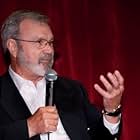A television network cynically exploits a deranged former anchor's ravings and revelations about the news media for its own profit, but finds that his message may be difficult to control.A television network cynically exploits a deranged former anchor's ravings and revelations about the news media for its own profit, but finds that his message may be difficult to control.A television network cynically exploits a deranged former anchor's ravings and revelations about the news media for its own profit, but finds that his message may be difficult to control.
- Won 4 Oscars
- 20 wins & 27 nominations total
- Director
- Writer
- All cast & crew
- Production, box office & more at IMDbPro
Storyline
Did you know
- TriviaPeter Finch was desperate to win the role of Howard Beale once he had read the script. He even offered to pay his own airfare to New York City for the screentest. But Sidney Lumet was concerned about Finch's Australian accent. Finch won the part after sending Lumet a recording of himself reading the New York Times with a perfect American accent.
- GoofsEvery one of Howard Beale's shows has the same studio audience (note the man in the black vest, with long hair and a beard).
- Quotes
Howard Beale: I don't have to tell you things are bad. Everybody knows things are bad. It's a depression. Everybody's out of work or scared of losing their job. The dollar buys a nickel's worth, banks are going bust, shopkeepers keep a gun under the counter. Punks are running wild in the street and there's nobody anywhere who seems to know what to do, and there's no end to it. We know the air is unfit to breathe and our food is unfit to eat, and we sit watching our TVs while some local newscaster tells us that today we had fifteen homicides and sixty-three violent crimes, as if that's the way it's supposed to be. We know things are bad - worse than bad. They're crazy. It's like everything everywhere is going crazy, so we don't go out anymore. We sit in the house, and slowly the world we are living in is getting smaller, and all we say is, 'Please, at least leave us alone in our living rooms. Let me have my toaster and my TV and my steel-belted radials and I won't say anything. Just leave us alone.' Well, I'm not gonna leave you alone. I want you to get mad! I don't want you to protest. I don't want you to riot - I don't want you to write to your congressman because I wouldn't know what to tell you to write. I don't know what to do about the depression and the inflation and the Russians and the crime in the street. All I know is that first you've got to get mad. You've got to say, 'I'm a HUMAN BEING, God damn it! My life has VALUE!' So I want you to get up now. I want all of you to get up out of your chairs. I want you to get up right now and go to the window. Open it, and stick your head out, and yell, 'I'M AS MAD AS HELL, AND I'M NOT GOING TO TAKE THIS ANYMORE!' I want you to get up right now, sit up, go to your windows, open them and stick your head out and yell - 'I'm as mad as hell and I'm not going to take this anymore!' Things have got to change. But first, you've gotta get mad!... You've got to say, 'I'm as mad as hell, and I'm not going to take this anymore!' Then we'll figure out what to do about the depression and the inflation and the oil crisis. But first get up out of your chairs, open the window, stick your head out, and yell, and say it: "I'M AS MAD AS HELL, AND I'M NOT GOING TO TAKE THIS ANYMORE!"
- Crazy creditsPaddy Chayefsky's credit in the opening credits says "by Paddy Chayefsky" (rather than "written by Paddy Chayefsky" or a variant thereof).
- ConnectionsEdited into Amérique, notre histoire (2006)
It couldn't be more related to today. Turn on the news and you see videos of how horrific the war on terror is and how horrific American society has become, but it stays on the air because people don't want to see the good things in life. They care about the bad and the corrupt. People must have laughed it off back then, but it was such a foreshadow to the near future. The performances are just as brilliant as the social commentary. Each actor becomes so absorbed into their characters that you can't even tell they're acting. It feels like you're watching these people in their daily lives, interacting and becoming more and more corrupt. Finch and Dunaway easily give two of the greatest performances of all time. I could write 20 more pages about it's brilliance, but I'll stop now to keep me from rating. I just have to say that it's so rare to find a film as incredibly flawless as this.
- dead47548
- Jan 8, 2008
Details
- Release date
- Country of origin
- Language
- Also known as
- Televizijska mreža
- Filming locations
- CTV Toronto Studios - 9 Channel Nine Court, Scarborough, Ontario, Canada(as CFTO-TV Studios, Control room and news studio scenes)
- Production company
- See more company credits at IMDbPro
Box office
- Budget
- $3,800,000 (estimated)
- Gross US & Canada
- $23,689,877
- Gross worldwide
- $23,692,346
- Runtime2 hours 1 minute
- Sound mix
- Aspect ratio
- 1.85 : 1
Contribute to this page
















































